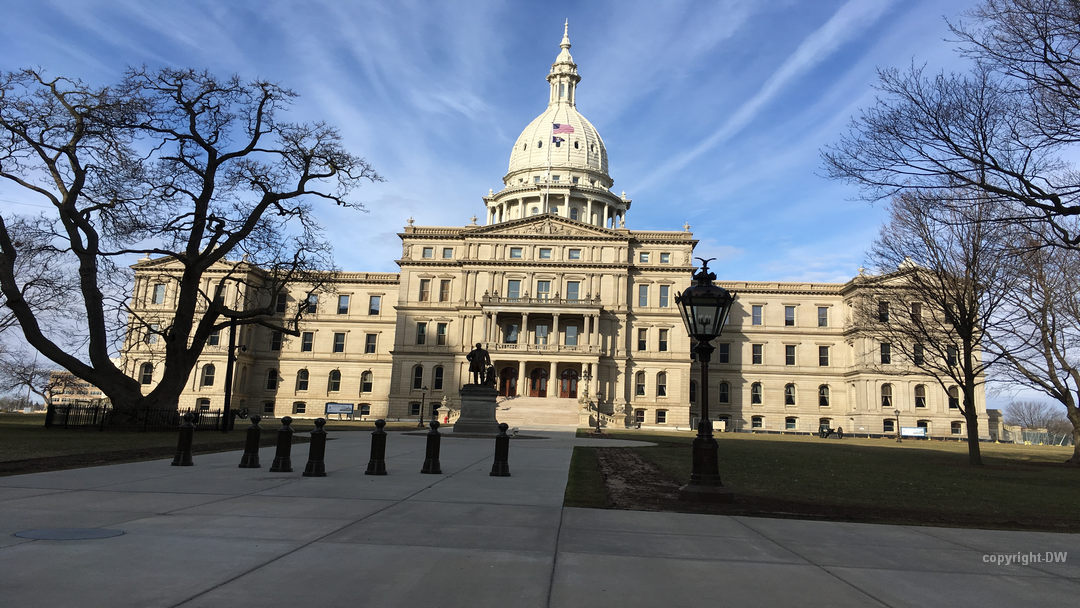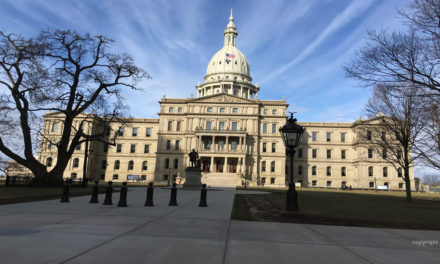Marihuana: administration; distribution of tax revenue from marihuana sales; modify.
Friendly Link: http://legislature.mi.gov/doc.aspx?2020-SB-0959
Sponsor
Adam Hollier (district 2)
(click name to see bills sponsored by that person)
Marihuana: administration; distribution of tax revenue from marihuana sales; modify. Amends secs. 3 & 14 of 2018 IL 1 (MCL 333.27953 & 333.27964).
Senate Introduced Bill
SENATE BILL NO. 959
| June 04, 2020, Introduced by Senator HOLLIER and referred to the Committee on Appropriations. |
A bill to amend 2018 IL 1, entitled
“Michigan Regulation and Taxation of Marihuana Act,”
by amending sections 3 and 14 (MCL 333.27953 and 333.27964).
THE PEOPLE OF THE STATE OF MICHIGAN ENACT:
Sec. 3. As used in this act:
(a) “Cultivate” means to propagate, breed, grow, harvest, dry, cure, or separate parts of the marihuana plant by manual or mechanical means.
(b) “Department” means the department of licensing and regulatory affairs.
(c) “Industrial hemp” means a plant of the genus cannabis Cannabis and any part of that plant, whether growing or not, with a delta-9 tetrahydrocannabinol concentration that does not exceed of 0.3% or less on a dry-weight basis , or per volume or weight of marihuana-infused product, or for which the combined percent of delta-9-tetrahydrocannabinol and tetrahydrocannabinolic acid in any part of the plant, of the genus cannabis regardless of moisture content, is 0.3% or less.
(d) “Licensee” means a person holding a state license.
(e) “Marihuana” means all parts of the plant of the genus cannabis, Cannabis, growing or not; the seeds of the plant; the resin extracted from any part of the plant; and every compound, manufacture, salt, derivative, mixture, or preparation of the plant or its seeds or resin, including marihuana concentrate and marihuana-infused products. For purposes of this act, marihuana Marihuana does not include any of the following:
(i) (1) the The mature stalks of the plant, fiber produced from the mature stalks, oil or cake made from the seeds of the plant, or any other compound, manufacture, salt, derivative, mixture, or preparation of the mature stalks. , except the resin extracted from those stalks, fiber, oil, or cake, or any sterilized seed of the plant that is incapable of germination;
(ii) (2) industrial Industrial hemp. ; or
(iii) (3) any Any other ingredient combined with marihuana to prepare topical or oral administrations, food, drink, or other products.
(f) “Marihuana accessories” means any equipment, product, material, or combination of equipment, products, or materials, which that is specifically designed for use in planting, propagating, cultivating, growing, harvesting, manufacturing, compounding, converting, producing, processing, preparing, testing, analyzing, packaging, repackaging, storing, containing, ingesting, inhaling, or otherwise introducing marihuana into the human body.
(g) “Marihuana concentrate” means the resin extracted from any part of the plant of the genus cannabis.Cannabis.
(h) “Marihuana establishment” means a marihuana grower, marihuana safety compliance facility, marihuana processor, marihuana microbusiness, marihuana retailer, marihuana secure transporter, or any other type of marihuana-related business licensed by the department.marijuana regulatory agency.
(i) “Marihuana grower” means a person licensed to cultivate marihuana and sell or otherwise transfer marihuana to marihuana establishments.
(j) “Marihuana-infused product” means a topical formulation, tincture, beverage, edible substance, or similar product containing marihuana and other ingredients and that is intended for human consumption.
(k) “Marihuana microbusiness” means a person licensed to cultivate not more than 150 marihuana plants; process and package marihuana; and sell or otherwise transfer marihuana to individuals who are 21 years of age or older or to a marihuana safety compliance facility, but not to other marihuana establishments.
(l) “Marihuana processor” means a person licensed to obtain marihuana from marihuana establishments; process and package marihuana; and sell or otherwise transfer marihuana to marihuana establishments.
(m) “Marihuana retailer” means a person licensed to obtain marihuana from marihuana establishments and to sell or otherwise transfer marihuana to marihuana establishments and to individuals who are 21 years of age or older.
(n) “Marihuana secure transporter” means a person licensed to obtain marihuana from marihuana establishments in order to transport marihuana to marihuana establishments.
(o) “Marihuana safety compliance facility” means a person licensed to test marihuana, including certification for potency and the presence of contaminants.
(p) “Marijuana regulatory agency” means the marijuana regulatory agency created under Executive Reorganization Order No. 2019-2, MCL 333.27001.
(q) (p) “Municipal license” means a license issued by a municipality pursuant to section 16 of this act that allows a person to operate a marihuana establishment in that municipality.
(r) (q) “Municipality” means a city, village, or township.
(s) (r) “Person” means an individual, corporation, limited liability company, partnership of any type, trust, or other legal entity.
(t) (s) “Process” or “Processing” “processing” means to separate or otherwise prepare parts of the marihuana plant and to compound, blend, extract, infuse, or otherwise make or prepare marihuana concentrate or marihuana-infused products.
(u) “Public safety officer” means that term as defined in section 2 of the public safety officers benefit act, 2004 PA 46, MCL 28.632.
(v) (t) “State license” means a license issued by the department marijuana regulatory agency that allows a person to operate a marihuana establishment.
(w) (u) “Unreasonably impracticable” means that the measures necessary to comply with the rules or ordinances adopted pursuant to this act subject licensees to unreasonable risk or require such a high investment of money, time, or any other resource or asset that a reasonably prudent businessperson would not operate the marihuana establishment.
Sec. 14. (1) 1. The marihuana regulation fund is created in within the state treasury. The department of treasury shall deposit into the fund all money collected under section 13 of this act and the department marijuana regulatory agency shall deposit into the fund all fees collected in the fund. under this act. The state treasurer shall direct the investment of the fund and shall credit to the fund interest and earnings from fund investments. The department marijuana regulatory agency shall administer the fund for auditing purposes. Money in the fund shall at the close of the fiscal year must remain in the fund and does not lapse to the general fund.
(2) 2. Funds for the initial activities of the department marijuana regulatory agency to implement this act shall be appropriated from the general fund. The department marijuana regulatory agency shall repay any amount appropriated under this subsection from proceeds in the fund.
(3) 3. The department marijuana regulatory agency shall expend money in the fund first for as follows:
(a) For the implementation, administration, and enforcement of this act. , and second, until 2022
(b) Until October 1, 2023 or for at least two 3 years, to provide $20 million annually to one whichever is later, for 1 or more development and research projects, including clinical trials, that are approved by the United States food and drug administration and sponsored by a non-profit Michigan-based, nonprofit organization or partnered with a researcher within an academic institution located in Michigan who is researching the efficacy of marihuana in various means of treating the medical conditions and preventing the suicide of public safety officers or United States armed services Armed Services veterans. and preventing veteran suicide. The marijuana regulatory agency shall expend $20,000,000.00 per year under this subdivision.
(4) Upon appropriation, unexpended balances must be allocated as follows:
(a) 15% to municipalities in which a marihuana retail store or a marihuana microbusiness is located, allocated in proportion to the number of marihuana retail stores and marihuana microbusinesses within the municipality. ;
(b) 15% to counties in which a marihuana retail store or a marihuana microbusiness is located, allocated in proportion to the number of marihuana retail stores and marihuana microbusinesses within the county. ;
(c) 35% to the school aid fund to be used for K-12 education. ; and
(d) 35% to the Michigan transportation fund to be used for the repair and maintenance of roads and bridges.








